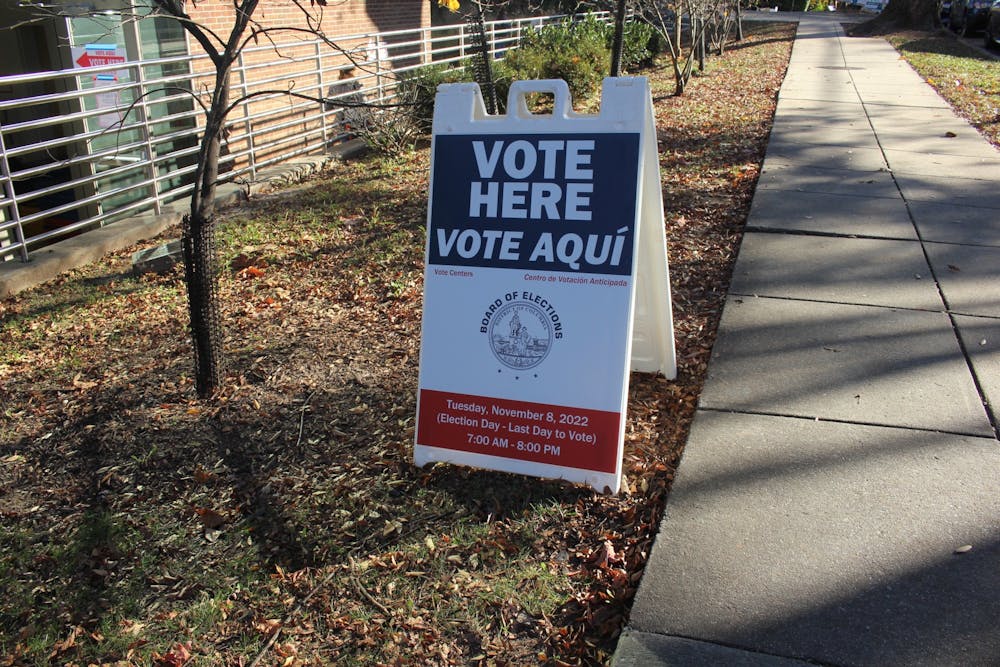Residents of D.C. who don’t have U.S. citizenship will be able to vote in local elections for the first time starting in 2024.
The change comes after the Local Resident Voting Rights Amendment Act of 2022 passed congressional review last month.
Under the new law, introduced and sponsored by Ward 1 Councilmember Brianne Nadeau, permanent residents will be able to vote in elections for mayor, D.C. Council, State Board of Education, Advisory Neighborhood Commissions, D.C. attorney general and any initiative or referendum. The law will not allow them to vote in federal elections.
Voting requirements will remain the same for citizens and non-citizens. Voters will have to be 18 years old by the time of the general election, must have lived in D.C. for at least 30 days before the election and cannot claim voting residence in any other U.S. state or territory.
“This is a victory not just for us but for D.C. because we’re really showing that we are a sanctuary city, a city where immigrants can come and be at peace,” said Kush Kharod, one of the main organizers pushing for the bill through a coalition of different organizations such as the Claudia Jones School for Political Education, the Sunrise Movement and the Metro DC Democratic Socialists of America.
The Local Resident Voting Rights Act passed the D.C. Council 12-0, with one abstention, in October.
Congress has the final say on D.C. laws because the District does not have statehood. The House of Representatives blocked the bill on Feb. 9, the same day it blocked the Revised Criminal Code Act. The Local Resident Voting Rights Act then went to the Senate, where it sat awaiting a vote it never received until the review period ended on March 14 — or Feb. 23, depending on who you ask — when the bill became law. (The criminal code overhaul was later blocked from becoming law by the Senate and President Joe Biden.)
Late last year, the bill was amended to extend voting rights not just to legal permanent residents but to any non-citizen, including undocumented immigrants. The idea of allowing non-citizens to vote in D.C. has been around for 10 years with similar bills dating back as far as 2013 with similar bills that would have reserved voting rights to green card-holders. Takoma Park, Maryland, has allowed non-citizen voting in local elections since 1992. Ten other Maryland municipalities also allow non-citizens to vote.
“Despite House Republican attempts to interfere, today the Local Resident Voting Rights Amendment Act became law,” Nadeau wrote in a press release. “Our neighbors — who pay taxes, attend our schools, and contribute to the vibrancy of our communities — will now also have a say in who represents them in our local government.”
Republicans in Congress, as well as other opponents of the bill, say that it will dilute the voices of U.S. citizens, incentivize illegal immigration and increase voter fraud.
Kharod said that this bill will instead help prevent voter fraud through a “variety of pools,” such as continuing the need to provide proof of residency, as well as creating more funding for voter outreach.
“Folks who are scared of election fraud also are scared of Black and brown people having the right to vote,” Kharod said. “This bill brings that fear front and center.”
Though the Local Resident Voting Rights Act is now law, there are still other ways for Congress to interfere with legislation in D.C., such as budget riders. These would prohibit the city from spending any money to implement the new law. This has been used in the past to stop D.C. from legalizing medical marijuana sales and subsidizing abortions for low-income women.
Nadeau told The Eagle that she doesn’t anticipate congressional Democrats will be giving much aid to Republicans on future D.C. bills, including in the use of budget riders.
“House members, including some Democrats, were clearly under pressure not to take a vote that could be used to make them look weak on crime – even though this bill should be seen as a tremendous advancement in addressing public safety,” she wrote in an email.
The blocking of the criminal code overhaul sparked outrage as frustrated citizens, and D.C. lawmakers rallied near Union Station while the Senate voted.
“Our disenfranchisement is on full display right now. We’re expanding voting rights here while our autonomy is under attack. It’s a pretty spectacular juxtaposition,” Nadeau wrote. “D.C. residents deserve full autonomy and representation. We are not allowed to send a voting representative to Congress, but Congress thinks it’s OK to make decisions for our city that they cannot and would not make for any other city or state in the country. Congress’ interference must not be tolerated, and their actions have made clearer than ever why D.C. must become the 51st state.”
International students at AU will be able to vote in D.C. local elections under the new law, as long as they can provide proof of residency. However, certain barriers can still limit students from voting in the District.
“We are reaffirming our values as D.C. as one that’s trying to get statehood, one that’s trying to show our residents that we want to be an inclusive and equitable society where everyone can thrive no matter what your immigration status is,” Kharod said. “Our most-often erased folks are now the ones that finally have a say in what our politicians and what our government does.”
This article was edited by Gabe Castro-Root, Jordan Young and Abigail Pritchard. Copy editing done by Isabelle Kravis, Luna Jinks and Stella Guzik.





